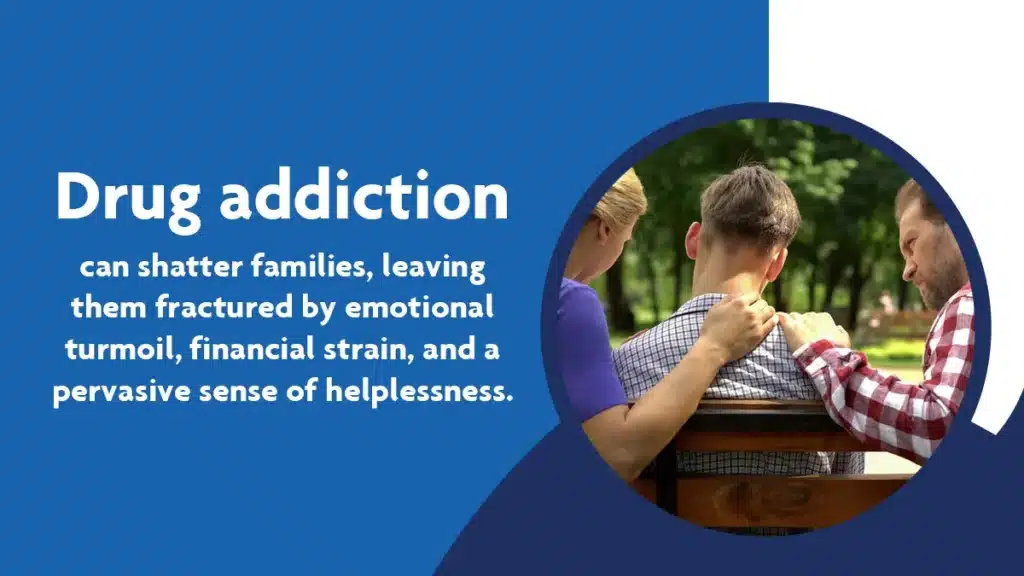Drug addiction doesn’t just affect the individual grappling with substance abuse. Its impact resonates throughout their family. From sleepless nights to constant worry, family members of teens with addiction suffer immense struggles. Addiction soaks into every aspect of familial life, leaving no one untouched.
It’s important for family members to seek professional help and adopt coping mechanisms to navigate the storm of addiction. This article delves into the multifaceted effects of drug addiction on families, as well as the path toward healing and recovery.
Key Takeaways
Families grappling with the teen’s drug addiction face a difficult journey marked by heartbreak and relentless struggles. Here’s what the article discusses:
- The psychological effects of drug addiction disrupt the fabric of family life, causing physical health consequences.
- Drug addiction often leads to financial struggles, burdening families with economic hardships and obligations.
- Families should adopt healthy coping mechanisms to manage or lessen the impacts of drug addiction.
Our dedicated teen treatment center is here to help your teen and family overcome the effects of drug addiction. Call us at (845) 479-6888 to get more information.

Understanding Drug Addiction
Drug addiction is a complex brain disorder characterized by compulsive drug seeking and use despite harmful consequences. Understanding drug addiction is crucial for parents and loved ones of teens facing substance abuse. It affects the brain’s natural reward system, leading to cravings and dependence. Teens are particularly vulnerable due to their still-developing brains, making them more susceptible to addiction.
Parents and loved ones must recognize the signs of drug addiction, such as changes in behavior, mood swings, and neglecting responsibilities. Early intervention is essential to prevent the progression of addiction. Communication is vital; open and non-judgmental conversations can encourage teens to seek help. Seeking professional assistance from counselors or support groups can provide guidance and support for the teen and their family.
It’s essential to understand that addiction is not a moral failing but a medical condition that requires treatment. With patience, empathy, and support, recovery is possible. Encouraging teens to engage in healthy activities, building strong relationships, and addressing underlying issues can aid their journey toward long-term recovery. Parents and loved ones can help their teens overcome addiction and lead fulfilling lives by educating themselves and offering unwavering support.
Psychological Impact Of Drug Addiction On Family
Drug addiction doesn’t just affect the person using illegal drugs; it also has a profound impact on their family. Firstly, there’s the emotional toll. Parents and loved ones often experience feelings of guilt, fear, shame, and helplessness as they witness their teen’s struggles. They may blame themselves for being unable to prevent it or feel embarrassed to seek support from others.
Secondly, there’s the strain on relationships. Constant worry and tension can lead to conflicts within the family. Trust may be broken as the addict’s behavior becomes unpredictable, leading to lies and deceit. This can create a cycle of resentment and mistrust, damaging the bond between family members.
Thirdly, there are practical challenges. Financial strain may occur as money is spent on drugs or treatment. Responsibilities may shift as family members prioritize dealing with the addiction over other aspects of their lives. This can lead to overwhelming and exhaustion as they navigate the chaos.
Overall, the psychological impact of addiction on a family can be profound and long-lasting. Loved ones need to seek support and education to cope with these challenges and provide the best possible care for their teen.
Financial Impact
Drug addiction can have a significant impact on families’ finances, affecting not just the individual struggling with substance use disorder (SUD) but also their loved ones. Firstly, the cost of supporting someone with addiction can be substantial, encompassing expenses like medical bills, therapy sessions, and rehab programs. These costs can quickly accumulate and strain a family’s finances.
Moreover, substance abuse may result in legal problems, such as fines or legal fees related to criminal activities associated with drug abuse. These legal expenses can add another layer of financial problems to the family. Furthermore, addiction can lead to damaged relationships within the family, causing emotional distress and potentially impacting the family’s ability to function effectively. As a result, the financial toll of addiction extends beyond monetary expenses, encompassing emotional costs as well.
Drug addiction not only inflicts emotional and relational hardships but also places a significant financial strain on families. From the direct costs of treatment to the indirect consequences like lost income and legal expenses, the financial instability due to alcohol addiction can be overwhelming. Families must seek support and resources to navigate these challenges and work towards recovery together.
Impact Of Drug Addiction On Family Relationships
Drug addiction can severely strain parent-child relationships, especially when teens are involved. It often starts with misunderstandings and arguments as parents struggle to comprehend their child’s behavior. As addiction escalates, trust breaks down, leading to feelings of betrayal and frustration. Parents may resort to blame or tough love, further alienating their young children.
Communication becomes strained as the focus shifts from healthy dialogue to confrontations about substance use. Teen substance abusers may withdraw emotionally, feeling misunderstood or judged. This lack of connection exacerbates the distance between parents and their children, creating a vicious cycle of resentment and isolation.
Despite these challenges, parents must seek support and education on addiction. By fostering open communication, setting boundaries, and seeking professional help, families can navigate the complexities of addiction together. Parents can rebuild trust and strengthen their relationships with struggling teens with patience, empathy, and persistence.
Health Consequences For Family Members
When a teenager struggles with substance abuse, it doesn’t just affect them. It ripples out to their family members, causing various physical health consequences. Stress becomes a constant companion for parents and family members, leading to increased blood pressure and a weakened immune system.
Furthermore, living in an environment where substance abuse is present can expose family members to hazardous substances. Secondhand smoke from cigarettes, marijuana, or heroin can increase the risk of respiratory problems and cancer. Accidental ingestion of drugs or exposure to drug paraphernalia puts family members at higher risk of poisoning or infection.
Moreover, the strain of coping with a teenager’s substance abuse can lead to unhealthy coping mechanisms among family members. Some may turn to alcohol or prescription drugs to numb their pain and anxiety, perpetuating a cycle of addiction within the entire family unit. These behaviors can exacerbate existing health issues and lead to further complications for family members.
In conclusion, the physical health consequences for family members of teenagers struggling with alcohol abuse are significant and wide-ranging. From stress-related symptoms to exposure to hazardous substances and unhealthy coping mechanisms, the devastating effects of addiction can be profound. Families must prioritize their well-being and seek support to navigate this challenging journey effectively.
Emotional Trauma In Family Members
Watching a loved one battle drug use can be emotionally traumatic for family members. Parents and other loved ones often experience helplessness, anger, guilt, and frustration as they witness their teen’s struggles. They may blame themselves for their child’s addiction, even though it’s not their fault. This emotional turmoil can lead to increased stress and anxiety, impacting their well-being.
Furthermore, family members may also face challenges in maintaining healthy boundaries and communication with the addicted individual. They may oscillate between wanting to help and resent or being overwhelmed by the situation. This internal conflict can take a toll on their mental health and strain relationships within the whole family.
Seeking support from family therapy, support groups, or counseling can be beneficial for family members dealing with emotional trauma or mental illness. These resources provide a safe space to express feelings, gain coping strategies, and connect with others who understand their struggles. It’s essential for parents and loved ones to prioritize their self-care and seek help when needed to navigate the challenges of supporting a teen struggling with substance abuse.
Coping Mechanisms For Family Members
Coping with a teen’s substance abuse problem can be overwhelming for parents and loved ones. Firstly, it’s crucial to prioritize self-care. This means taking breaks when needed, seeking emotional support from friends or support groups, and engaging in activities that bring joy and relaxation. Additionally, setting boundaries is essential. Communicate expectations and consequences and stick to them consistently. This helps establish a sense of stability and accountability within the family.
Education plays a vital role in coping with a teen’s substance abuse. Take the time to learn about addiction, its causes, and available resources for help. Understanding the nature of the problem can reduce feelings of confusion and helplessness. Moreover, practicing effective communication is vital. Encourage open dialogue with your teen, allowing them to express themselves without judgment. Active listening fosters trust and can facilitate productive conversations about seeking treatment or making positive changes.
Seeking professional help is essential in coping with a teen’s substance abuse. Therapists, counselors, and support groups specialized in addiction can offer guidance and support tailored to your family’s basic needs. Don’t hesitate to reach out for assistance when necessary.
Remember, you’re not alone in this journey. People and resources are available to help you navigate these challenging times. By prioritizing self-care, setting boundaries, educating yourself, practicing effective communication, and seeking professional help, you can better cope with a teen’s substance abuse and support them toward recovery.
Frequently Asked Questions (FAQ)
What are the factors affecting drug abuse in the family?
Several factors contribute to drug abuse within families, including genetic predisposition to addiction, parental substance abuse, emotional stress, family history of addiction, relationship strain, lack of parental supervision, family member’s addiction, communication breakdown, emotional abuse, family conflict, physical abuse, early exposure to drug use within the household, and socio-economic factors such as poverty or unemployment.
Additionally, the presence of mental health disorders, trauma, peer pressure, and external influences can play significant roles. These elements create an environment conducive to substance abuse, perpetuating a cycle that can be challenging to break without intervention and support.
How does addiction affect family members’ mental health status?
Addiction profoundly impacts the mental health of family members, leading to increased stress, anxiety, depression, and feelings of helplessness or guilt. Loved ones often experience emotional turmoil, strained relationships, and a sense of constant uncertainty. They may develop codependent behaviors or experience trauma-related symptoms due to the chaos and instability associated with addiction.
Furthermore, financial strain and social stigma can exacerbate these effects. Over time, the cumulative stress of coping with a family member’s addiction can lead to severe mental health issues, necessitating therapeutic interventions and support services for both the individual struggling with addiction and their family members.
Empower Your Teen’s Journey To Recovery
Is your family struggling with a teen’s substance abuse? Our teen treatment center offers tailored professional help and support to meet your needs.
We offer residential treatment to provide quality care and round-the-clock support to guide your teen toward healing. We offer evidence-based therapies, holistic approaches, and medication management tailored to your teen’s needs.
Our dedicated staff is committed to offering care and guidance. Families can expect weekly updates on their child’s progress, ensuring transparency and support throughout their journey to recovery.
Contact us today at (845) 479-6888 to learn more about the healing and recovery journey.


